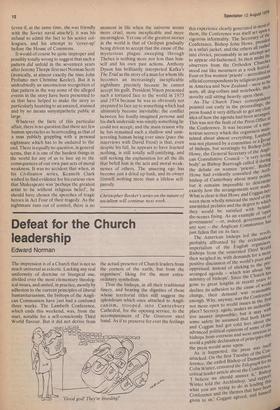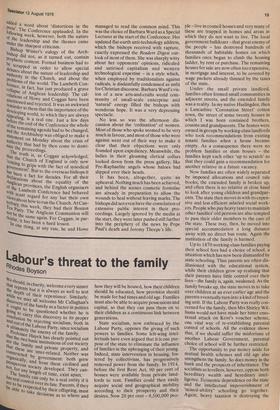Defeat for the Church leadership
Edward Norman
The impression is of a Church that is not so much universal as eclectic. Lacking any real uniformity of doctrine or liturgical use, divided over the most elementary theological issues, and united, in practice, mostly by adhesion to the current principles of liberal humanitarianism, the bishops of the Anglican Communion have just had a confused three weeks. The Lambeth Conference, which ends this weekend, was, from the start, notable for a self-consciously Third World flavour. But it did not derive from the actual presence of Church leaders from the corners of the earth, but from the organisers' liking for the most extraordinary symbolism.
Thus the bishops, in all their traditional finery, and bearing the dignities of those whose territorial titles still suggest the splendours which once attached to Anglicanism, trooped into Canterbury Cathedral, for the opening service, to the accompaniment of The Groovers steel band. As if to preserve for ever the feelings
S
this experience clearly c dn them, the Conference was itself set up00 a rplegt Spectator al t 2 e August im 10 s9:08f vigorous informality. The Secretary of tile Conference, Bishop John Howe, presided in a safari jacket, and the others all rushed into civvies, presumably in an attempt not to appear old-fashioned. In their midst the observers from the Orthodox Churches stood out like mourners at a rock festival. uFfofujcrjuoircfoivneewspoumuedn `en ptsr ibeystcse' ijgajuccursedjuiutetudaaiss in America and New Zealand — were to be seen, all dog-collars and notebooks, their novelty still sitting heavily upon them. As The Church Times correspondent pointed out early in the proceedings, the press found it very difficult to get any clew idea of how the agenda had been arrange' This was not the fault of the Press Office at the Conference. It was because of a Mysterious secrecy which the organisers main tamed about almost everything. Lambeth was not planned by a committee or a groliP of bishops, but seemingly by Bishop J0h„11 'Howe, the General Secretary of the Angn. can Consultative Council — 'a very loving body' as Bishop Burrough called it during the debate on women 'priests'. Bishop Howe had evidently consulted the Archbishop of Canterbury about many Points' but it remains impossible to determine exactly how the arrangements were made. What is clear is that Howe and Coggan between them wholly misread the mood of the assembled prelates and the degree to whic“ they would be satisfied with behind' the-scenes fixing. As an example of 'openf government' — or, indeed, government ° jaunsyt fsuouret u— fitahteuAnglicannjts face ,Communion fla The American bishops led the revolt, probably affronted by the ecclesiastical imperialism of the English organisers: Bishops from the venerated Third World then weighed in, with demands for a more, positive discussion of the world's poor 00 oppressed, instead of sticking to the prearranged agenda — which was about `trw ministry of bishops'. Since the Church has gone to great lengths in recent years declare its adhesion to the cause of worla change, their demand was reasonable enough. Why, anyway, was the Conference s, not more open to world issues in the fict: place? Secrecy, again, makes an author'. tive answer impossible; but it may wit° some safety be assumed that both Howe and Coggan had got cold feet about. advanced political opinions of some otttl._ bishops from overseas and were anxious t_ rao, avoid a public declaration of principles II t the press would seize upon. As it happened, the press was l_tse_lf, attacked. On the first Tuesday of the ference, the exiled Bishop of Dan aralr .ets ale. Colin Winter, censured the Telegraph critical leader article about the Con,ferf: oishop 'I believe we should answer it,' Winter told the Archbishop, 'and suPPt°hrits what you are trying to do in leadin.gseif Conference and the themes that have been given to us.' Coggan agreed, and hiin added a word about 'distortions in the ' Press'. The Conference applauded. In the following week, however, both the nature of the leadership and the themes came under the sharpest criticism. Bishop Winter's eulogy of the Archbishop did not, as it turned out, contain Prophetic content. Formal business had to he Scrapped in order to allow special debates about the nature of leadership and authority in the Church, and about the Problems of the world. The Lambeth Conference, in fact, has just produced a grave collapse of Anglican leadership. The calculations of Howe and Coggan have been questioned and rejected. It was an awkward reminder to them that the importance of the developing world, to which they are always ,aPPealing, is a real one. Just a few days before the end of the Conference the whole Of the remaining agenda had to be changed, and the Archbishop was obliged to make a statement on Monday about the crisis of authority that had by then come to dominate the proceedings. The truth is, as Coggan ackowledged, that the Church of England is only now Coining to grips with the fact of synodical Pvernment'. But to the overseas bishops it nas been a fact for decades. For all their d.eclarations about the equality of the fititglican provinces, the English organisers u‘vt. the Lambeth Conference had behaved scant regard for any but their own views about how to run the Church. At Can ,i,erbury this week, they had their Boston _.en Party. The Anglican Communion will tnot be the same again. For Coggan, in par ticular has been a hard lesson. In one thing, at any rate, he and Howe managed to read the common mind. This was the choice of Barbara Ward as a Special Lecturer at the start of the Conference. Her updated flat-earth anti-technology address, which the bishops received with rapture, exactly expressed the Readers Digest outlook of most of them. She was sharply witty about her opponents' opinions, ridiculed and satirised capitalism and western technological expertise — in a style which, when employed by traditionalists against radicals, is disdainfully condemned as unfit for Christian discourse. Barbara Ward's vision of a new arts-and-crafts world community of small-scale enterprise and 'natural' energy filled the bishops with wondrous hope. It was a very depressing spectacle.
No less so was the afternoon discussion about the 'ordination' of women. Most of those who spoke seemed to be very much in favour, and most of those who were against went out of their way to make it clear that their objections were only founded upon expediency. Meanwhile, the ladies in their gleaming clerical collars looked down from the press gallery, like Pre-Raphaelite angels whose haloes had slipped over their heads.
It has been, altogether, quite an upheaval. Nothing much has been achieved, and behind the scenes cosmetic formulae are already in preparation to allow the wounds to heal without leaving marks. The bishops did not even have the consolation of extensive public interest in their proceedings. Largely ignored by the media at the start, they were later pushed still further into the periphery of the news by Pope Paul's death and Jeremy Thorpe's life.































 Previous page
Previous page